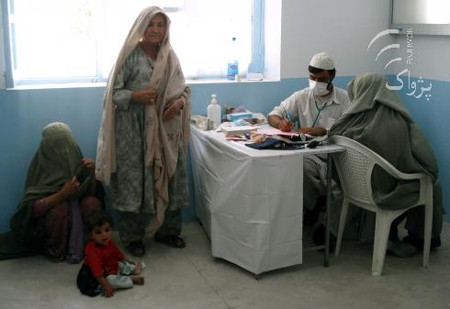By Rob Taylor
Afghanistan's government and foreign donors spend barely $10 a person on health, despite pointing to it as key to winning back support against a worsening insurgency that has dragged on for nearly a decade, a study said Sunday.
The other $31 per person that makes up the country's meager health spend comes from Afghans themselves, many of whom struggle to provide doctors and drug care for their families from the $426 per capita they earn each year.

Reuters, Apr. 17, 2011: Afghanistan's government and foreign donors spend barely $10 a person on health, despite pointing to it as key to winning back support against a worsening insurgency that has dragged on for nearly a decade, a study said Sunday. The other $31 per person that makes up the country's meager health spend comes from Afghans themselves, many of whom struggle to provide doctors and drug care for their families from the $426 per capita they earn each year.
"High expenses pose severe barriers to accessing healthcare, particularly for the rural poor. Catastrophic payments in particular can push households into debt," the study said.
The two-year study provided the first ever snapshot into spending within the rudimentary health system, and aid donors said the information should help improve health quality in a nation where life expectancy is only 44 years.
Acting Health Minister Suraya Dalil said the study would also help President Hamid Karzai's government fight corruption in the health system, which in turn could improve public trust in the U.S.-backed administration, dogged by frequent accusations of widespread wastage and graft.
"How money is spent is just as important as how much we spend. More money is needed to overcome Afghanistan's health challenges," Dalil said at the study launch.
The report found Afghanistan spends close to 10 percent of its GDP wealth each year on health, or just over $1 billion.
But that amounted to only around $42 per person on health services, well below even regional neighbors like India, Pakistan and Iran. Wealthy nations average around $3,060 per head, according to World Health Organization figures.
Afghan government spending supplied only 6 percent of total health financing, while donors provided 18 percent and private sources accounted for 76 percent.
Most of that burden was met by households in a nation where 10.5 million people -- 42 percent of the population -- live below the national poverty line of earning $1 a day or less.
"This type of spending is disconcerting and unsustainable," the report said, calling for policy changes including increased government spending and community-based health finance schemes.
Afghanistan's health system is one of the world's worst, a decade after the U.S.-backed overthrow of the Taliban, with life expectancy roughly 10 years lower than sub-Saharan Africa.
Maternal mortality, estimated at 1,400 deaths for every 100,000 live births, is the highest in the world, while infant and under five mortality are estimated at 111 and 161 deaths per 1,000 births respectively.
But the health accounts showed only two percent of total health spending went to maternal and child health improvement.
Ordinary Afghans want peace, but they also want improved governance, and better health and education services, according to humanitarian agencies working in the country.
In provinces heavily affected by fighting, like the Taliban strongholds of Helmand and Kandahar in the south, U.S. and NATO troops have been building schools and health clinics in hopes of denting public backing for the insurgency, but there has been less spending in more peaceful areas.
Dalil said the expenditure snapshop would help the government direct money in future to where it was most needed, including cutting child and maternal death rates.
(Editing by Andrew Marshall)



